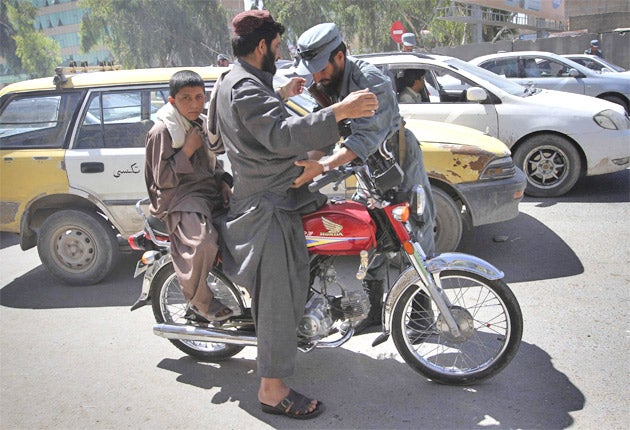Forces search for barefoot suspects after prison break

Nato and Afghan security forces trying desperately to round up at least 475 escaped Taliban prisoners who broke out of a Kandahar jail were forced to resort to the most primitive detection methods yesterday: searching for suspects with bare feet.
The approach was deemed logical because the escapees, who crawled to freedom down a 1,000ft tunnel, all left their shoes behind when they made the extraordinary escape on Monday. "Basically there's an order out to arrest anyone walking around barefoot," one US soldier told Time magazine.
Coalition forces are also trying to match anyone suspected of being an inmate of Sarpoza prison with a biometric database of the prisoners. Officials said that a day after the spectacular break-out, 65 prisoners had been recaptured and two killed in a gunfight.
The implications of the spectacular escape are severe. If history is any guide, then the flood of able fighters, including Pakistanis and field commanders, into the countryside surrounding Kandahar city could herald a sharp rise in violence at a time when many were already predicting the bloodiest spring and summer in a decade.
The benefits to the Taliban don't stop there. The psychological impact of their coup – which comes just days after a suicide bomber disguised as a policeman killed the provincial chief of police – is already being felt by Kandahar residents, who are bracing for a wave of attacks. "How can we trust or rely on a government that can't protect the police chief inside the police headquarters and can't keep prisoners in the prison?", asked Islamullah Agha Bashir, who sells washing machines and other appliances in Kandahar city. "Last night while we were eating dinner I told my two sons not to go out as much, because I am afraid that now, when the morale of the Taliban is high, they will attack more."
The escape is another in a seemingly endless series of dents in the credibility of the Afghan security forces.
Afghanistan's Justice Minister told President Hamid Karzai yesterday that "collaborators inside the prison" staff were partly to blame for the break-out. The news of yet another inside job – the jailbreak follows a string of attacks in which insurgents have infiltrated the security forces – casts serious doubts over the readiness of the Afghan army and police to start taking control of the country from Nato this summer, even though this is a crucial part of the West's plan to extricate itself from Afghanistan.
Three months before they take responsibility for security in seven parts of the country, Afghanistan's security forces – especially the police – are in a parlous state. A top US official told a Congressional hearing on Monday that in the absence of a centralised, automated system, the Afghan government has no idea how many police are actually on its books.
"What does that mean?" said Herbert Richardson, the Special Inspector General for Afghanistan Reconstruction. "That means you can have ghost employees; you can have Awol employees; individuals who are under multiple names collecting pay cheques; and there's no way to account for it. So therein lies a very significant problem."
Another harbinger of the difficulties to come was the murder of the deputy chairman of the Helmand peace council at the weekend. Haji Zahir, a controversial figure who spent four years in a German jail for trying to murder a stepson who questioned him for beating his wife, was gunned down as he dined with his boss, Najib Popal. Mr Popal was left miraculously unscathed.
Join our commenting forum
Join thought-provoking conversations, follow other Independent readers and see their replies
Comments
Bookmark popover
Removed from bookmarks